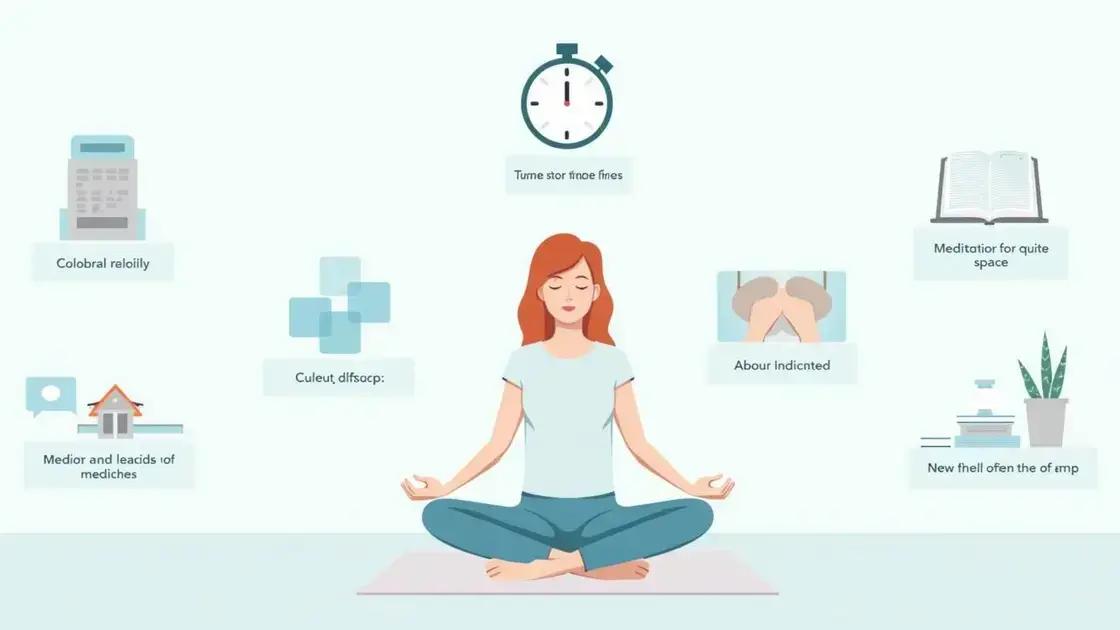Meditation offers numerous benefits for stress and health, including reduced anxiety, improved emotional well-being, enhanced focus, and better sleep quality. Regular practice can boost your immune system and promote mental clarity, making it a valuable tool for achieving overall wellness.
Meditation is a powerful practice that brings numerous benefits for both stress relief and overall health. By focusing your mind and eliminating distractions, meditation allows you to find inner peace and tranquility. In this article, we will explore how the benefits of meditation for stress and health can transform your life, helping you cope with daily challenges more effectively. From understanding the basics of meditation to practical tips for incorporating it into your routine, discover how this ancient practice can enhance your well-being.
Understanding Meditation

Meditation is an ancient practice that helps people find calmness and clarity. It involves focusing your mind and eliminating distractions. This practice has gained popularity in recent years due to its amazing benefits for stress reduction and health improvement.
What is Meditation?
Meditation is a way to quiet the mind. It can involve sitting in silence, focusing on your breath, or repeating a mantra. Many people meditate for a few minutes each day, but even short sessions can be beneficial.
Different Types of Meditation
There are various types of meditation. Some popular forms include:
- Mindfulness Meditation: This involves paying attention to the present moment without judgment.
- Guided Meditation: In this type, a teacher or recording guides you through the process.
- Transcendental Meditation: This technique uses a specific mantra to help you settle into deep relaxation.
Each type has unique benefits, and finding the right one for you can enhance your practice.
Why Practice Meditation?
People practice meditation for many reasons. For some, it is a way to cope with stress. For others, it is a tool for self-improvement and emotional well-being. Through meditation, individuals can develop a greater sense of awareness and connection to their inner selves.
As you explore meditation, remember that it’s important to find a quiet space and time where you can focus on your practice. With regular practice, you might notice improvements in your mood, clarity of thought, and health.
How Meditation Reduces Stress

Stress is a common issue that many people face in their daily lives. It can come from work, relationships, or personal challenges. One of the most effective ways to combat stress is through meditation. This practice helps calm the mind and body, leading to a more peaceful state.
How Meditation Works to Reduce Stress
Meditation slows down your heart rate and lowers blood pressure. When you focus on your breath or a specific thought, you shift your attention away from stressors. This helps reduce feelings of anxiety and tension.
Effects on the Brain
Research shows that meditation can change the brain. Regular practice can decrease the production of stress hormones like cortisol. It also increases the size of areas of the brain responsible for emotional regulation, allowing for better stress management. This rewiring contributes to a more relaxed and resilient mindset.
Mindfulness and Stress Relief
Mindfulness meditation, in particular, teaches individuals to stay present. By concentrating on the current moment, you become less affected by worries about the future or regrets from the past. This present-moment awareness helps lessen stress and fosters a sense of acceptance.
Breathing Techniques
Many forms of meditation incorporate breathing techniques. Focusing on your breath can instantly provide a sense of calm. Deep, slow breaths help activate the body’s relaxation response, countering stress signals. Techniques like “4-7-8 breathing” can be especially effective in stress relief.
Health Benefits of Regular Meditation

Regular meditation offers numerous health benefits that can improve your overall well-being. One major benefit is enhanced mental clarity. When you meditate often, you can think more clearly and make better decisions.
Boosts Emotional Health
Meditation has been linked to improved emotional health. By practicing regularly, people report feeling happier and more content. It helps in reducing symptoms of depression and anxiety, creating a positive impact on daily life.
Improves Focus and Concentration
Through meditation, individuals can experience improved focus. Regular practice can enhance your ability to concentrate on tasks, making it easier to accomplish goals. This is especially useful in today’s fast-paced world where distractions are everywhere.
Supports Immune System
Research indicates that meditation can also boost the immune system. It helps lower stress levels, which in turn can decrease inflammation and improve your body’s ability to fight illnesses. A stronger immune system means better health and well-being.
Enhances Sleep Quality
Many people who meditate find that their sleep improves over time. By calming the mind and relaxing the body, meditation can make it easier to fall asleep and stay asleep. Better sleep quality leads to increased energy and health during the day.
Tips for Effective Meditation Practices

Practicing meditation can be easier and more beneficial with the right tips. Here are some helpful suggestions for effective meditation practices.
Find a Quiet Space
Select a peaceful location where you won’t be disturbed. A quiet room or a serene outdoor spot can help you relax and focus better during meditation.
Set a Regular Schedule
Consistency is key. Try to meditate at the same time every day, whether in the morning, during lunch, or before bed. This helps create a habit that can lead to lasting benefits.
Start with Short Sessions
If you’re new to meditation, begin with shorter sessions. Start with just 5 to 10 minutes and gradually increase the duration as you become more comfortable. This can help you stay engaged without feeling overwhelmed.
Use Guided Meditation
Guided meditation apps or recordings can be very helpful, especially for beginners. These guides provide direction, making it easier to focus and stay on track.
Be Patient and Kind to Yourself
It’s normal for your mind to wander during meditation. When this happens, gently bring your focus back without judgment. Practicing patience with yourself is key to developing a successful meditation habit.
Experiment with Techniques
There are several meditation techniques to explore, such as mindfulness, loving-kindness, or visualization. Try different methods to find what resonates best with you.
Embracing Meditation for a Healthier Life
The journey to a healthier, more balanced life can begin with simple meditation practices. By understanding the profound benefits of meditation for stress and health, you can cultivate a practice that suits your needs.
Implementing effective techniques such as mindfulness, regular scheduling, and finding your quiet space will enhance your meditation experience. Remember, patience is essential as you explore the various forms of meditation.
With commitment and consistency, the rewards of meditation can be truly life-changing, offering mental clarity, emotional well-being, and improved physical health. So take a deep breath, find your calm, and embrace the powerful journey of meditation.
FAQ – Frequently Asked Questions about Meditation for Stress and Health
What are the main benefits of meditation?
Meditation helps reduce stress, improves emotional health, boosts focus, and enhances overall well-being.
How often should I meditate?
Aim to meditate daily or several times a week. Consistency can help you experience the full benefits.
Do I need special tools or equipment for meditation?
No special tools are needed! You just need a quiet space and a few minutes of your time.
Can beginners practice meditation easily?
Yes, beginners can start with short sessions and guided meditations, making it easy to learn and practice.
What should I do if my mind wanders during meditation?
It’s normal for thoughts to pop up. When you notice it, gently guide your focus back to your breath or mantra.
Are there different types of meditation I can try?
Yes, there are many types such as mindfulness, loving-kindness, and guided meditation. Explore different techniques to find what suits you best.













